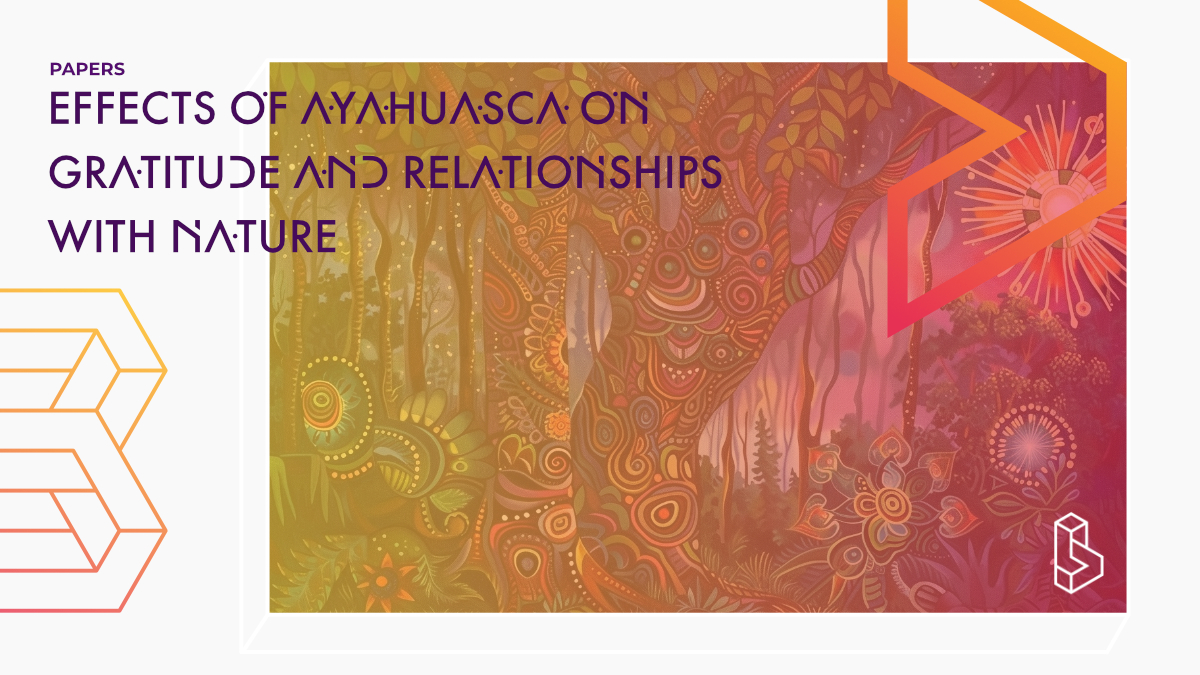This longitudinal study (n=54) investigates the effects of ayahuasca retreat experiences on gratitude, nature relatedness, and nature appreciation. Findings reveal significant increases in these factors at one-week and one-month follow-ups compared to baseline. Ratings of mystical experiences and awe during ayahuasca sessions weakly-to-moderately correlate with these increases, highlighting their potential role in post-ayahuasca changes. Participant age negatively relates to the occurrence of mystical experiences and awe, indicating diminished effects with increased age. The study emphasizes the quality of experiences over quantity in influencing post-ayahuasca changes, suggesting potential mental health benefits associated with prosocial changes in gratitude and nature relationships.
Abstract of Effects of Ayahuasca on Gratitude and Relationships with Nature: A Prospective, Naturalistic Study
“Qualitative studies and anecdotal reports suggest that experiences with ayahuasca, a psychedelic brew found in Central and South America, may be followed by individuals enduringly feeling more grateful and connected to nature. Yet, to date, these changes have been understudied. Here, participants (N = 54) completed validated surveys related to gratitude, nature relatedness, and nature appreciation one-week before, one-week after, and one-month after attending an ayahuasca retreat center. Compared to baseline, there was a significant increase in gratitude, nature relatedness, and nature appreciation at the one-week and one-month follow-ups. Ratings of mystical-type experiences and awe, but not ego dissolution, during participants’ ayahuasca sessions were weakly-to-moderately correlated with these increases. The number of ayahuasca ceremonies attended at the retreat was not related to change in outcomes, underscoring the importance of the quality rather than the quantity of the experiences in post-acute change. Lastly, participant age was negatively related to the occurrence of mystical-type experiences and awe, supporting literature indicating blunted psychedelic effects with increased age. In the context of study limitations, the results suggest that mystical-type experiences and awe occasioned by ayahuasca may be linked to prosocial changes in gratitude and relationships with nature that may be beneficial to mental health.”
Authors: Jacob S. Aday, Emily K. Bloesch, Alan K. Davis, Sarah E. Domoff, Kyle Scherr , Josh D. Woolley & Christopher C. Davoli
Summary of Effects of Ayahuasca on Gratitude and Relationships with Nature: A Prospective, Naturalistic Study
Psychedelic drugs, such as LSD, psilocybin, mescaline, and DMT, have been shown to have positive effects in clinical trials for depression, substance misuse, and end-of-life distress. However, many areas of social functioning and personality have been reported to be altered as a result of psychedelic experiences.
Ayahuasca is a psychedelic plant-based tea used in Central and South America that contains DMT and MAOIs. It is usually administered in a ceremonial context and its psychoactive effects continue for approximately 4 – 5 hours after ingestion.
There is convergent evidence suggesting that individuals experience increased gratitude after ayahuasca and other psychedelic experiences. Griffiths et al. (2018) found that high doses of psilocybin increased gratitude in healthy volunteers, but it is unclear which facets of gratitude may be affected. It is also unclear how other drug effects may account for these changes.
Find this paper
Effects of Ayahuasca on Gratitude and Relationships with Nature: A Prospective, Naturalistic Study
https://doi.org/10.1080/02791072.2024.2312980
Paywall | Google Scholar | Backup | 🕊
Cite this paper (APA)
Aday, J. S., Bloesch, E. K., Davis, A. K., Domoff, S. E., Scherr, K., Woolley, J. D., & Davoli, C. C. (2024). Effects of Ayahuasca on Gratitude and Relationships with Nature: A Prospective, Naturalistic Study. Journal of Psychoactive Drugs, 1-10.

